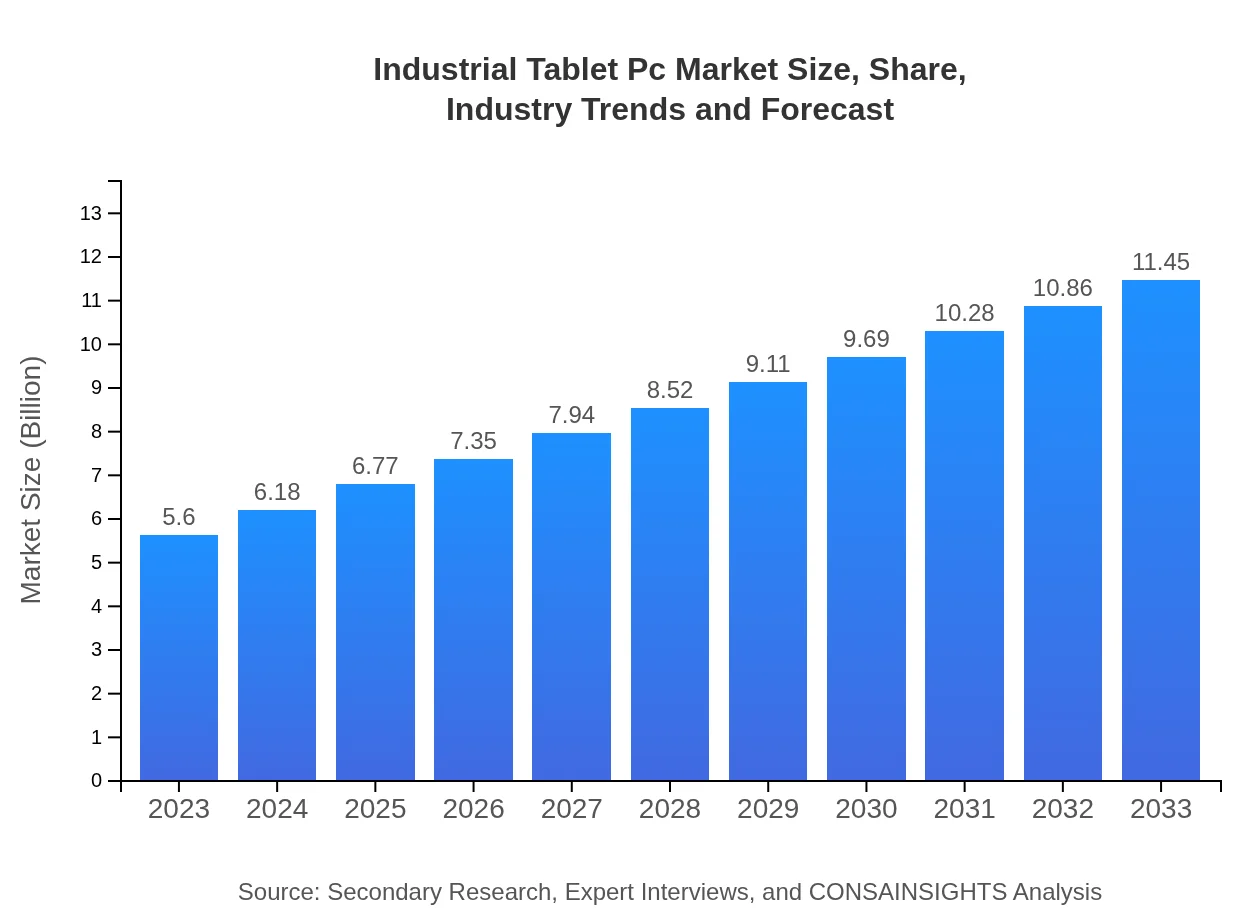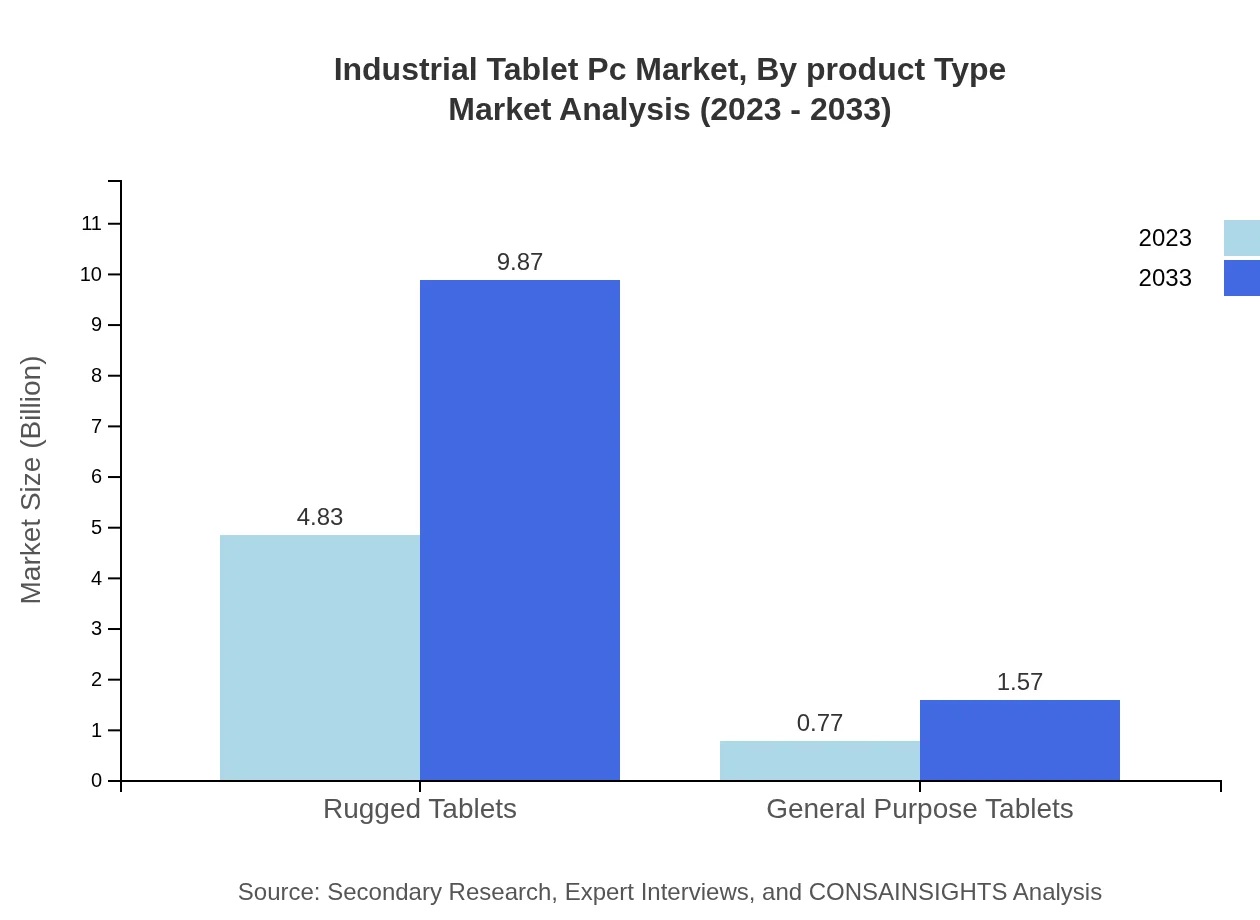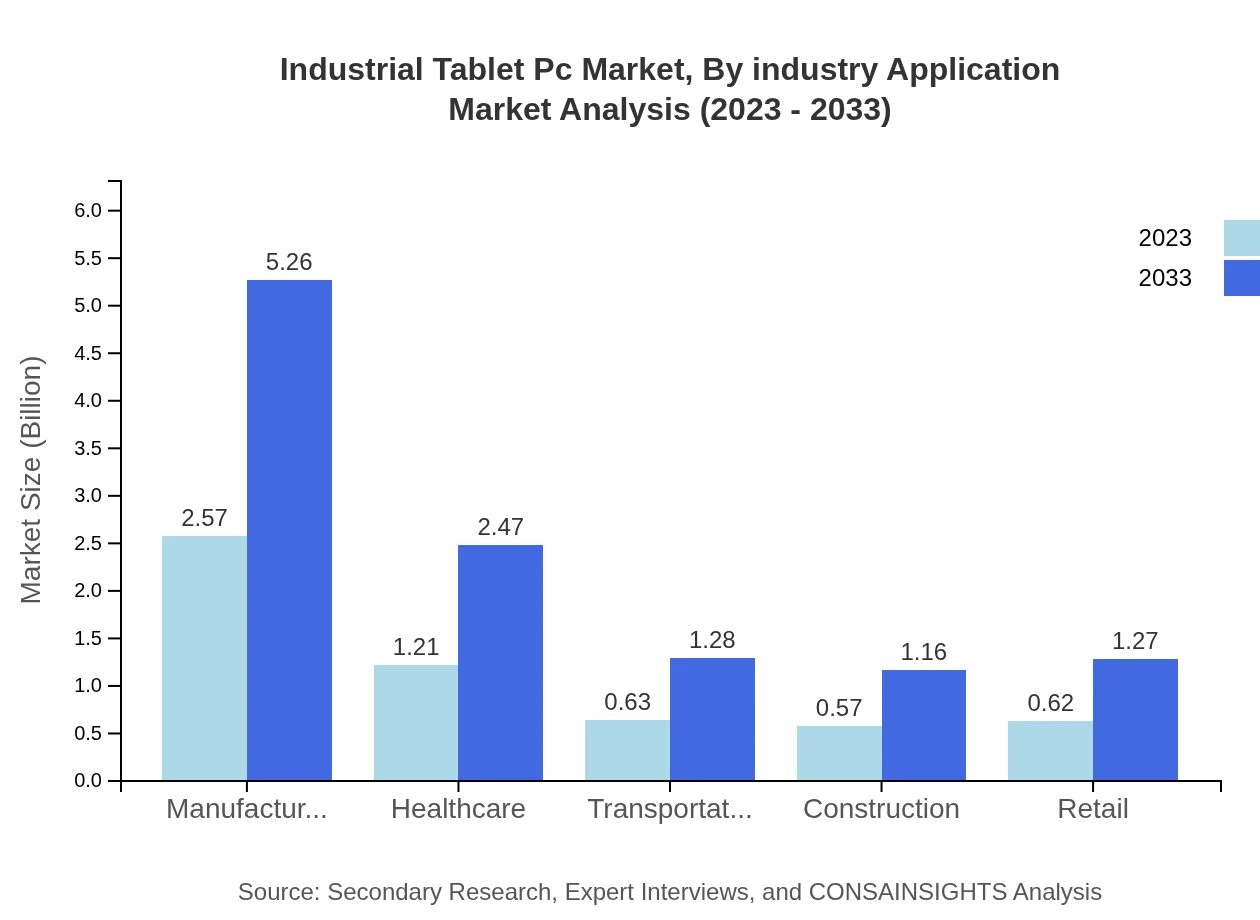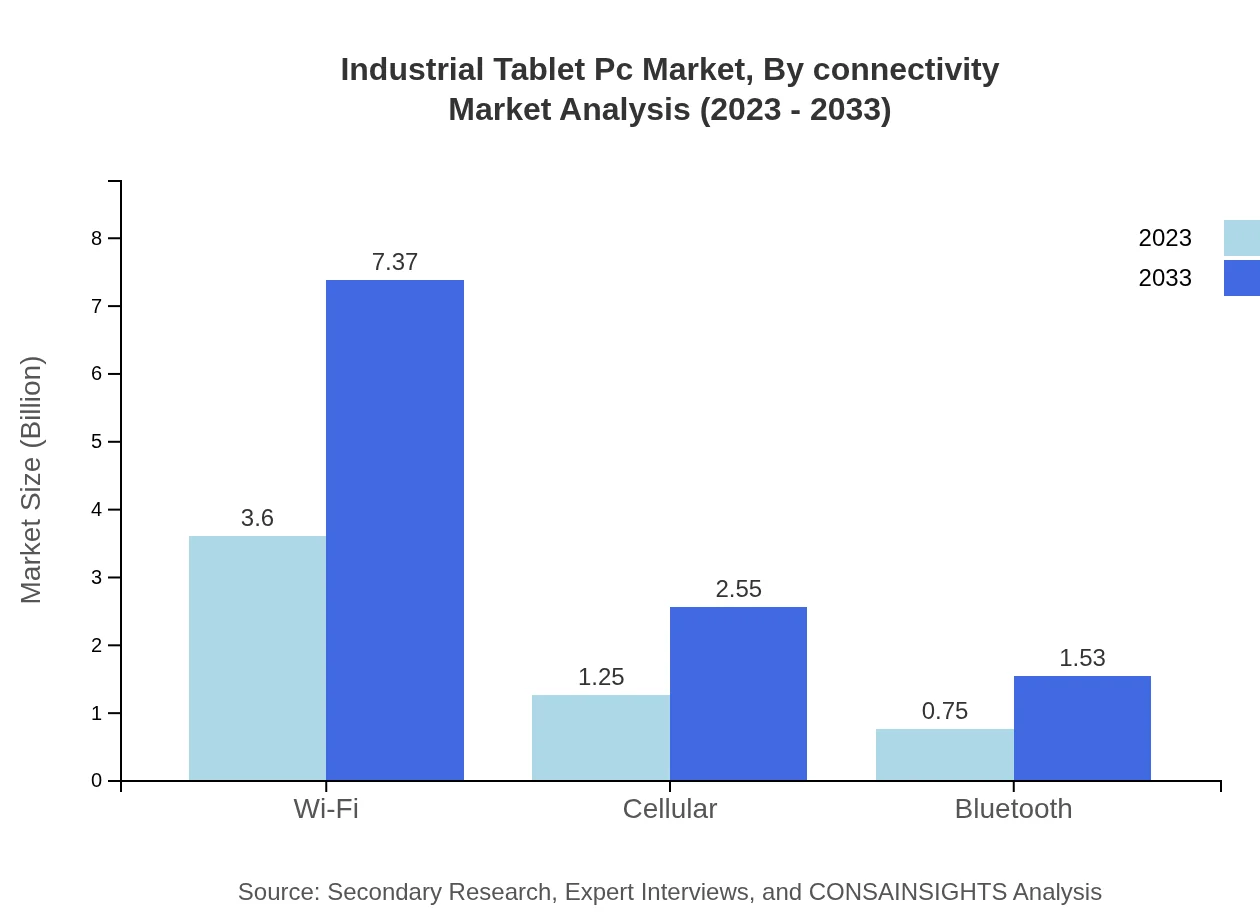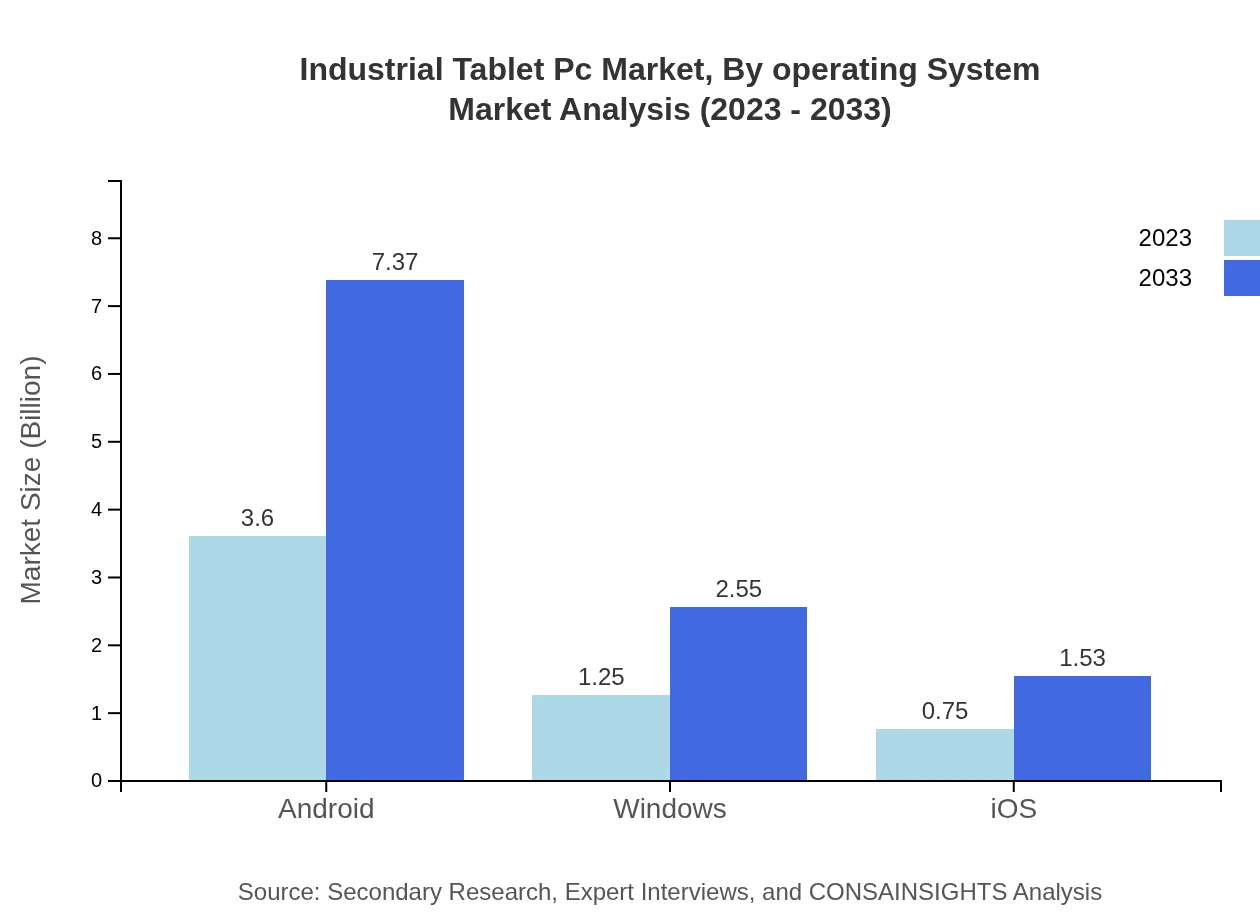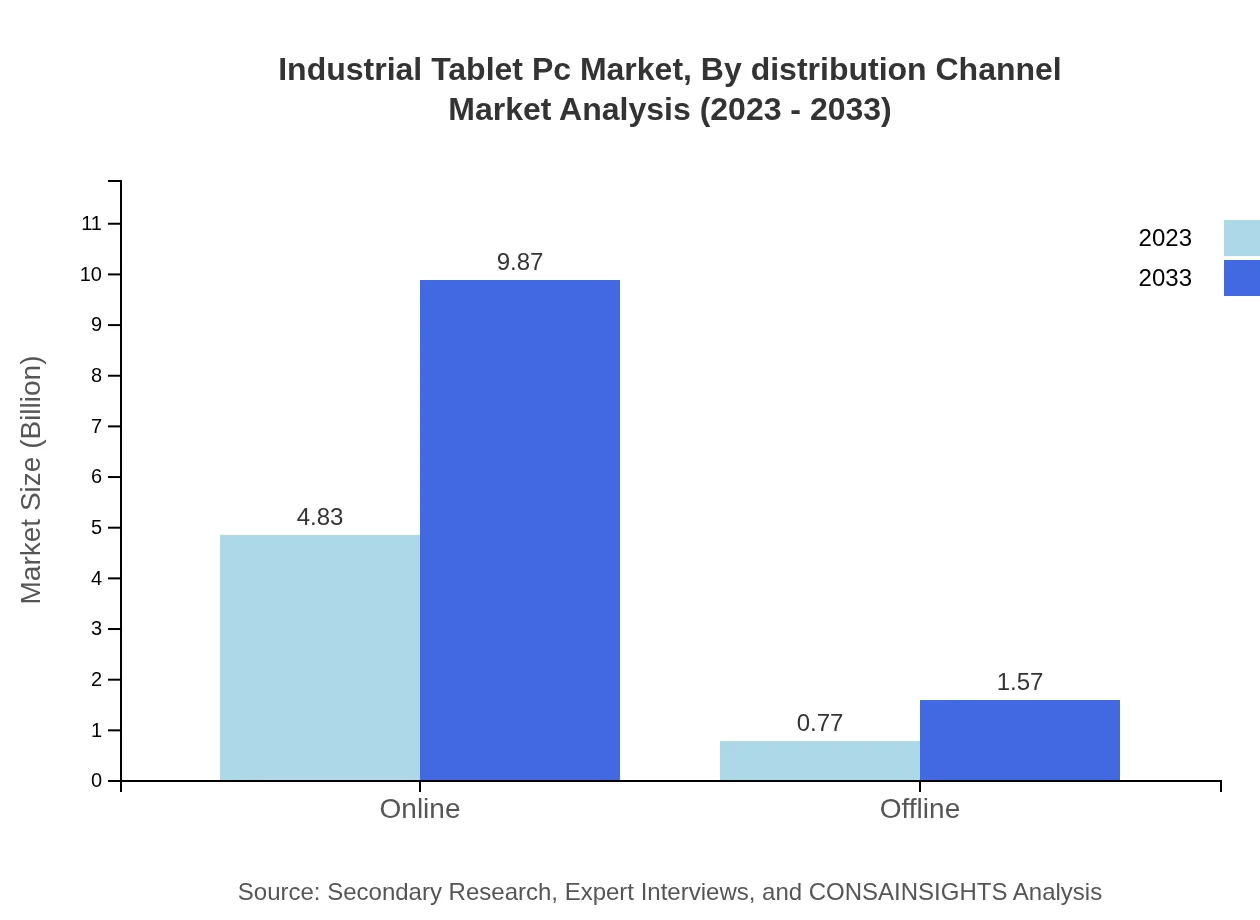Industrial Tablet Pc Market Report
Published Date: 31 January 2026 | Report Code: industrial-tablet-pc
Industrial Tablet Pc Market Size, Share, Industry Trends and Forecast to 2033
This report provides a comprehensive analysis of the Industrial Tablet PC market, highlighting size, trends, technology advancements, and future forecasts from 2023 to 2033. It offers insights into regional dynamics, leading players, and market segmentation.
| Metric | Value |
|---|---|
| Study Period | 2023 - 2033 |
| 2023 Market Size | $5.60 Billion |
| CAGR (2023-2033) | 7.2% |
| 2033 Market Size | $11.45 Billion |
| Top Companies | Panasonic, Zebra Technologies, Samsung Electronics, Getac Technology |
| Last Modified Date | 31 January 2026 |
Industrial Tablet PC Market Overview
Customize Industrial Tablet Pc Market Report market research report
- ✔ Get in-depth analysis of Industrial Tablet Pc market size, growth, and forecasts.
- ✔ Understand Industrial Tablet Pc's regional dynamics and industry-specific trends.
- ✔ Identify potential applications, end-user demand, and growth segments in Industrial Tablet Pc
What is the Market Size & CAGR of Industrial Tablet PC market in 2023?
Industrial Tablet PC Industry Analysis
Industrial Tablet PC Market Segmentation and Scope
Tell us your focus area and get a customized research report.
Industrial Tablet PC Market Analysis Report by Region
Europe Industrial Tablet Pc Market Report:
The European market for Industrial Tablet PCs is set to grow from $1.62 billion in 2023 to $3.31 billion by 2033. The emphasis on smart manufacturing and the EU's push for Industry 4.0 are key growth drivers in this region.Asia Pacific Industrial Tablet Pc Market Report:
In Asia Pacific, the Industrial Tablet PC market is projected to grow from $1.07 billion in 2023 to approximately $2.19 billion by 2033. The region's rapid industrialization, coupled with growing investments in technology, is driving the demand for advanced tablets in sectors like manufacturing and logistics.North America Industrial Tablet Pc Market Report:
North America is anticipated to witness substantial growth, with the market size expanding from $1.96 billion in 2023 to $4.01 billion by 2033. This growth is fueled by the high adoption of technology in industries, especially in the manufacturing and healthcare sectors.South America Industrial Tablet Pc Market Report:
The South American Industrial Tablet PC market is expected to increase from $0.19 billion in 2023 to $0.39 billion in 2033. While currently small, the market is gaining traction due to rising automation and digitalization initiatives in various industries across the continent.Middle East & Africa Industrial Tablet Pc Market Report:
In the Middle East and Africa, the market is expected to grow from $0.76 billion in 2023 to $1.54 billion by 2033. The ongoing infrastructural developments and increased focus on digital transformation in various sectors are propelling market growth.Tell us your focus area and get a customized research report.
Industrial Tablet Pc Market Analysis By Product Type
The product type segment consists primarily of rugged tablets and general-purpose tablets. In 2023, the market for rugged tablets is expected to reach $4.83 billion and is projected to grow to $9.87 billion by 2033, capturing 86.25% of the total market share. General-purpose tablets, while less prominent in the industrial context, hold significance with an estimated market size of $0.77 billion in 2023, expanding to $1.57 billion by 2033.
Industrial Tablet Pc Market Analysis By Industry Application
The industry application segment reveals diverse growth, especially in manufacturing, which holds the largest share at 45.97% in 2023 with a market size of $2.57 billion, expected to reach $5.26 billion by 2033. Healthcare applications lag slightly in market share but are valued at $1.21 billion in 2023, reaching $2.47 billion by 2033, indicating substantial growth potential.
Industrial Tablet Pc Market Analysis By Connectivity
Connectivity options for Industrial Tablet PCs significantly influence user preference. Wi-Fi connected tablets lead the market with a size of $3.60 billion in 2023, projected to grow to $7.37 billion by 2033. Cellular connectivity, currently at $1.25 billion, is expected to rise to $2.55 billion, driven by the need for reliable internet access in remote operations.
Industrial Tablet Pc Market Analysis By Operating System
The operating system segment predominantly features Android, Windows, and iOS. Android leads with a market size of $3.60 billion in 2023, growing to $7.37 billion by 2033. Windows tablets, while holding a smaller share, are significant with market values projected to rise from $1.25 billion to $2.55 billion within the same timeframe.
Industrial Tablet Pc Market Analysis By Distribution Channel
The distribution channels analysis indicates that online sales are substantial, commanding a market size of $4.83 billion in 2023, which is expected to increase to $9.87 billion by 2033. Offline sales continue to play a role but are significantly less, moving from $0.77 billion to $1.57 billion during the same period.
Industrial Tablet PC Market Trends and Future Forecast
Tell us your focus area and get a customized research report.
Global Market Leaders and Top Companies in Industrial Tablet PC Industry
Panasonic:
A leading provider of rugged tablet solutions known for its durable and high-performance devices specifically designed for industrial applications.Zebra Technologies:
Specializes in mobile computing solutions, offering innovative tablets and scanners tailored for industrial and retail environments.Samsung Electronics:
Produces a range of industrial-grade tablets with advanced features catering to various sectors including manufacturing and logistics.Getac Technology:
A global leader in rugged computing solutions, Getac designs and manufactures industrial tablets that withstand extreme conditions and enhance operational efficiency.We're grateful to work with incredible clients.









FAQs
What is the market size of industrial Tablet Pc?
The industrial tablet PC market is currently valued at approximately $5.6 billion in 2023 and is projected to grow at a CAGR of 7.2%, reaching an estimated $10.31 billion by 2033.
What are the key market players or companies in this industrial Tablet Pc industry?
Key players in the industrial tablet PC market include leading technology companies such as Zebra Technologies, Panasonic, Xplore Technologies, Getac, and rugged device producers focusing on specialized industrial applications.
What are the primary factors driving the growth in the industrial Tablet Pc industry?
Growth in the industrial tablet PC industry is driven by increased automation in industrial processes, demand for mobile computing solutions, advancements in rugged technology, and the push for workplace safety leading to higher adoption of portable devices.
Which region is the fastest Growing in the industrial Tablet Pc?
The fastest-growing region in the industrial tablet PC market is North America, expected to rise from $1.96 billion in 2023 to $4.01 billion by 2033, driven by strong industrial activity and technological advancements.
Does ConsaInsights provide customized market report data for the industrial Tablet Pc industry?
Yes, ConsaInsights offers customized market reports tailored to specific needs within the industrial tablet PC sector, allowing clients to gain insights relevant to their strategic goals and market demands.
What deliverables can I expect from this industrial Tablet Pc market research project?
From the industrial tablet PC market research project, you can expect detailed market analysis, growth forecasts, regional insights, competitive landscape evaluations, and segment-wise breakdown of market data.
What are the market trends of industrial Tablet Pc?
Trends in the industrial tablet PC market include a surge in demand for rugged devices, increasing adoption of IoT and connectivity features, preference for Android and Windows operating systems, and a shift towards online sales channels.

